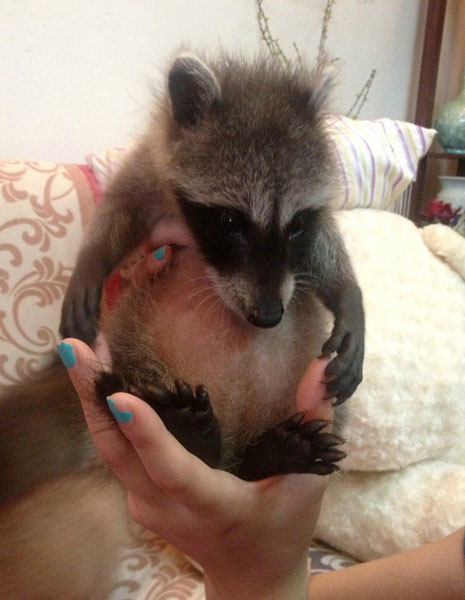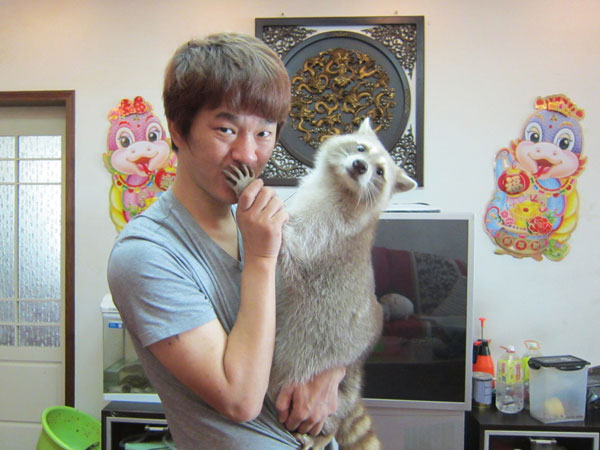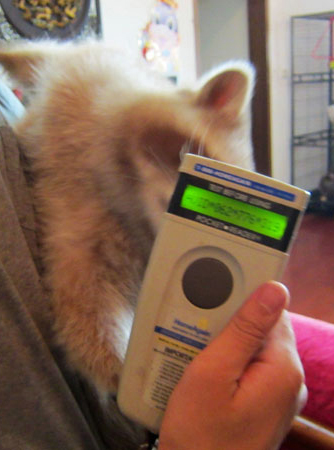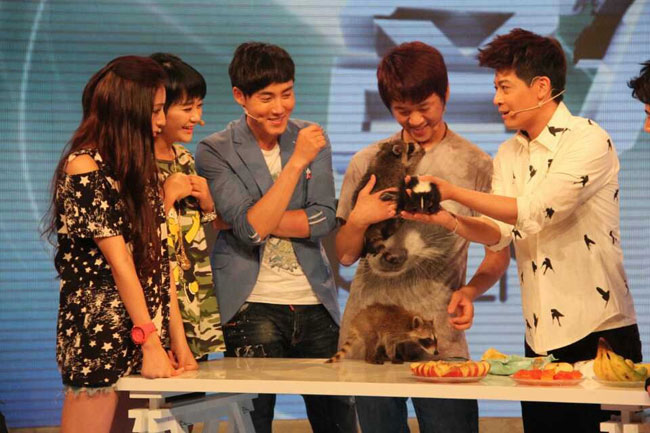Yes, that’s right. The animal, cute as a button, which also has the reputation of being a pilferer, are making debut appearance as pets in China, thousands of miles away from their native home in North America.
 Raccoons have recently taken China’s biggest microblogging platform Weibo by storm with their cute pictures and videos, inducing a collective “aw” from the Chinese Weibo users. Along with the latest coon frenzy comes the jaw-dropping news that domesticated raccoons are available as pets in China, generating an even bigger debate.
Raccoons have recently taken China’s biggest microblogging platform Weibo by storm with their cute pictures and videos, inducing a collective “aw” from the Chinese Weibo users. Along with the latest coon frenzy comes the jaw-dropping news that domesticated raccoons are available as pets in China, generating an even bigger debate.
Weibo users posted many cute pictures of pet raccoons, like this one. Photo: weibo.com
While some trendy pet owners and supporters uploaded pictures of the “adorable and playful” pet raccoons on Weibo, claiming that they are docile and close to their human masters just as human babies are to their parents, the opposition, led by @江宁公安在线, who posted a long Weibo post delineating the cons of keeping raccoons as pets, argued strongly against the budding trend.
The crux of the argument, it seems, hinges on one point, which is whether the raccoon is domesticated or wild.
Worthy companions: breeder
According to Huang Nanrui @黄楠瑞-明宠宠物 who claims to be the first person to introduce domesticated raccoons to China, real pet raccoons are “nothing like their wild counterparts” whose harmful behavior he knows all too well having experienced it himself when living in the US. “When my friend told me he had a pet raccoon, I was shocked.” Huang recalled. “So I went to see it myself, and was enamored by its cuteness.”
“The problem is people do not know that there are legally imported pet raccoons. You can see for yourself what they are like.” Huang’s favorite raccoon, a one-year-old golden raccoon called “Jin Zaizai”, is very mellow and lively at the same time. Another four-month-old baby raccoon is even a bit timid when first meeting a stranger. The way the animal held onto a human reminds one strongly of a human baby.

Huang Nanrui and his pet Jin Zaizai. Photo: sino-us.com
Huang started his raccoon business three years ago. A set of original documents showed the entire process his raccoons went through, coming all the way from the US to Beijing. After passing all the inspections, they have to be quarantined for a month at the customs before finally allowed in.
His first batch of raccoons was the 52nd generation of domesticated raccoons imported from a farm in the State of New York. Earlier this year, he bred the 53rd generation and raised them with his own method: bottle-feeding the baby raccoons separated from their mothers at the age of 8 days.
“At that young age, their eyes have not yet opened and they only have the sense of smell. We feed them ourselves with special bottles and milk which is also imported from the US,” Huang explained. The idea is to foster a strong attachment between the raccoons and the humans, which Huang hopes could further reduce the chances of them attacking people, which are already very low among the sterilized pet raccoons.
Huang said the raccoon needs to be socialized with people and the environment we live in, which requires a lot of time and patience on the part of the owners. "It is not the best pet choice for people with a busy life," he cautioned.
 Each and every single one of Huang’s raccoons has microchips implanted before being sold. "That is to ensure that I can trace the raccoons and their owners should they get lost or abandoned," he said.
Each and every single one of Huang’s raccoons has microchips implanted before being sold. "That is to ensure that I can trace the raccoons and their owners should they get lost or abandoned," he said.
Huang Nanrui demonstrating the serial number of Jin Zaizai's chip. Photo: sino-us.com
For the past two years, he has sold about 50 pet raccoons to customers in areas as far as Guangzhou. "I have had people returning their coons to me but I haven't heard anyone dumping any of them," Huang said, "It's not just because they are cute pets, but also because they are rather expensive pets."
Huang has just closed his pet shop in a bid to reduce the price of the pets. "Last year my raccoons were sold at 20,000 yuan ($3,268). Next year I will sell them at about 13,000 yuan ($2,124.2)," Huang said. It is his strategy to compete with the illegal raccoon dealers. By forcing his competitors to drop their price, he hopes he could eventually push them to discontinue their illegal business because it will yield too little profit to be worth taking the risk.
"I know there are people illegally smuggling raccoons from Taiwan and Japan. These people do not vaccinate and sterilize their raccoons, which are not pet raccoons to begin with. People might go to them for their relatively cheaper price, but they will soon realize they are buying trouble. These animals are most likely to be dumped by their buyers which will also create ecological problems," Huang said.
In response to the online criticism of the raccoon business, Huang defended, "If I don't do this, others will. At least I am providing legal, safe, and genuine pet raccoons. They are bred to be pets and cannot survive in the wild. I am only trying to find them loving homes. What is wrong with that?"
Need for supervision: Expert
Raccoons are not on the list of protected wild animals issued by the Chinese State Forestry Administration, nor are they one of the species listed on the appendix of the Convention on International Trade in Endangered Species of Wild Fauna and Flora (CITES) which are forbidden in international trade. Therefore, they can be imported and legally traded as pets in China.
Zhang Jinshuo Ph.D, (张劲硕 Weibo: @国家动物博物馆员工) a researcher at the Institute of Zoology of the Chinese Academy of Science, is surprisingly one of the cautious supporters of pet raccoons on Weibo. "Having held Huang Nanrui's pet raccoons in my arms, I want to own one too," he wrote on his Weibo after recording a TV program together with Huang.

Huang Nanrui and his pet raccoons as well as pet skunks have made quite a few appearances on TV in China. Photo: Courtesy of Huang Nanrui
However, he warned in the same post that people who want to raise a pet raccoon should be very careful in choosing their animals, which have to be purchased from legal breeders and properly vaccinated, sterilized and microchipped.
When asked about the safety issue of keeping pet raccoons, Zhang admitted that even after over 50 generations of domestication, there is no guarantee that they are 100% safe. "Even dogs sometimes bite. And people have been domesticating dogs for at least 15,000 years," Zhang said," There is always danger involved when you are in close contact with animals."
"I am against keeping wild animals as pets. I certainly do not think that it is appropriate to promote domestication of raccoons as pets. But for those novelty-seeking people, as long as they can keep the animals in a scientific and legal way, I see no harm in it,” Zhang said.
Whether the illegally imported raccoons will cause an "external species invasion" and whether they will threaten China's ecological system, Zhang dismissed the worries. "External invasions happen all the time. But we haven't had serious cases in big mammals and birds in China due to rather strict regulation and inspection."
"In Japan where people too imported raccoons as pets from the US, it indeed became an issue before. So would it be in many other countries. But in China, the situation is a bit different," Zhang explained, "I suspect that the raccoons that escaped into the wild are probably going to end up being caught by people, either for their fur or for their meat."
"However, even if that is the case, for the sake of people's health and the environment, the control of all imported species should be tightened and strictly observed," Zhang concluded.
|
|
||
 |
| Touched | Sympathetic | Bored | Angry | Amused | Sad | Happy | No comment |
Rhythm Media Group is a multi-media company, operating a US-based Chinese daily newspaper, The China Press, and the paper's website - uschinapress.com (which has mobile-app version), as well as a Beijing-based English website Sino-US.com. The group boasts 15 branch offices across the US, and a number of cultural centers focusing on culture-related business in the North America, Chinese mainland, Hong Kong and Taiwan.Launched in September 2012, the Sino-US.com is designed to serve as a bridge between China and the US, and to keep its readership inside or outside China better informed by providing news and insights on China's current affairs, culture, life, business, people and sports.
|
|